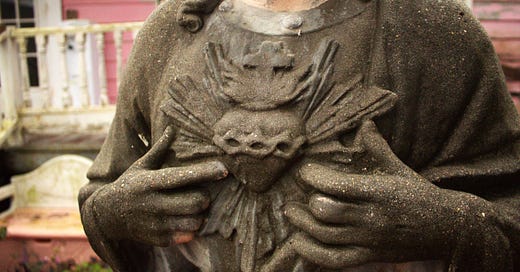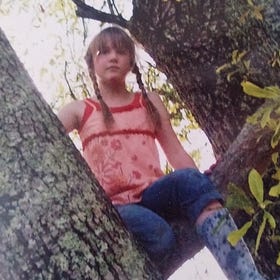Back to Progress
An essay by Victoria Richard on the ways she and her hometown of Progress, MS, have changed—and stayed the same—with the passage of time
Down the interstate, the trees have started to fold in for the winter. Some wear cloaks of red and orange. The ginkgoes turn yellow. Still, the day is gray. Clouds roll in heavily, brushing the tops of pines like seaweed in the ocean. If you were to drive down I-55 South for the summer, the way I did for my mother’s mastectomy in August, that same sky would be too bright to look at. The road would be lined with wildflowers (some may call them weeds). Ironweed, partridge pea, coreopsis would all dot the landscape, mottling a sea of green.
My grandparents are celebrating their sixtieth anniversary this month and for Christmas my mother asked me to take portraits of them at their home in Progress, Mississippi. They live in a white house on a hill. Down the slope and across a red dirt road is the double-wide trailer I grew up in.
I’ve only been back to Progress a handful of times since I started college in 2019. But every time it is a little different than I expected.
“How many camellias do you think you own now?” I asked my grandmother, eyeing four large additions near the front porch.
“Well, I can’t say I ever counted them, but probably close to 120.”
I raise the camera, chattering while my grandparents hold each other lovingly. I debate whether I should tell them that I chose my own partner with their love in mind.
After we stroll through the forest of camellias, my grandfather asks if we should go anywhere else.
“Let’s try Blanchard Road, by the live oaks.” During my precarious tween years, I had ridden horses on Blanchard Road. When the man that owned them passed, all the horses had to be sold. Most of the live oaks that hung over the road were still there, but a few had been trimmed into stumps.
Twenty minutes from Progress is Magnolia, the town where I used to get gas on my way to school in McComb. Where there once was a handful of tiny restaurants and shops in Magnolia, I noticed this trip that the streets were barren. Outside of a closed antique shop stone representations of Mother Mary and The Sacred Heart of Jesus stood guard, patches of peach colored paint still clinging to the crooks of their necks. A bright red sign hung over a nearby church’s door asking its patrons to pray for America.
Small things, but all so different from what I remembered.
Driving towards Hattiesburg to drag my best friend to see the Wicked movie, I passed the home of my grandmother’s best friend. Even though she’s been gone for a year I still expected her to be in the driveway the same way I expected my grandparents to still be growing corn in their eighties.
I am the same, circling around my same hobbies until I have carved a path in the ground. I have played the same video game every week for a year. I’ve done Duolingo while I dry my hair since I was fifteen. I am a creature that thrives on a certain level of consistency, but my circles are less concentric and more like links.
It doesn’t feel like only eight years since I started high school. But since then, it seems like I have tossed and then returned to a hundred things. Each time I return, I remake them.
In high school most of my writing was vaguely religious, focusing on angels and other supernatural figures. Then during the pandemic I started writing poetry, contemplating the meaning of the new atmosphere I found myself in. I’d like to think that now I’ve found a bridge between those two things, working predominantly in creative nonfiction about the faith environments of my childhood.
I still like most of the same movies and books I did back then. When I go to McComb, I still find myself crawling to Buffalo Express for a boneless wing combo.
But when I look at the changing little town of Progress I wonder if I would have been happier if it had never progressed at all. My grandparents have Wi-Fi now. But what if I wanted there to be one place in the country where no one could reach me? But then I would have to ask, what if I had never moved to Jackson and asked other people about their church, their school? What if I had never had the ability to type “religious trauma” into a search engine? They say that ignorance is bliss. But I can’t say I was happier back then.
Things don’t look the same and they probably never will. But I keep linking my circles, taking what I loved from each of my life experiences and knitting them together. I can’t go back any more than I can stop breathing and even though it hurts sometimes, maybe I like it that way.
Victoria Richard is a writer, gardener, and aspiring curator originally from Progress, Mississippi. In 2019, Victoria came to Jackson to study at Millsaps College - and never left. Between the ages of fifteen and nineteen, Victoria was involved in a high control religious group. This experience has provided her with a passion for bringing stories of hidden abuse to light. Victoria now shares her personal journey of trauma and healing on her Substack, Angels Over Presley Boulevard. Versions of her story have also appeared online in i got out and Tears of Eden. Her work to reconnect to her father's Louisiana heritage is forthcoming in Deep South Magazine. Whenever she isn't researching cults and interviewing survivors, she works to highlight local talent at the Mississippi Museum of Art.
Read more from Victoria Richard:
Girls Like Us
"When I was eight or nine, my mother enrolled me in a program called 'Keepers at Home.' Like the name suggests, the concept of the program was to teach young girls to 'keep the home—to be housewives. I learned cooking, cross-stitching, knitting, and other things I was told would keep my future family comfortable and happy and bring us 'glory in heaven.'"







What a beautiful essay, Victoria! And 120 camellias??? Wow. I'm mighty impressed by your grandmother's garden, even without ever seeing it. You should interview her about it and document what she's accomplished in another one of your wonderful essays.